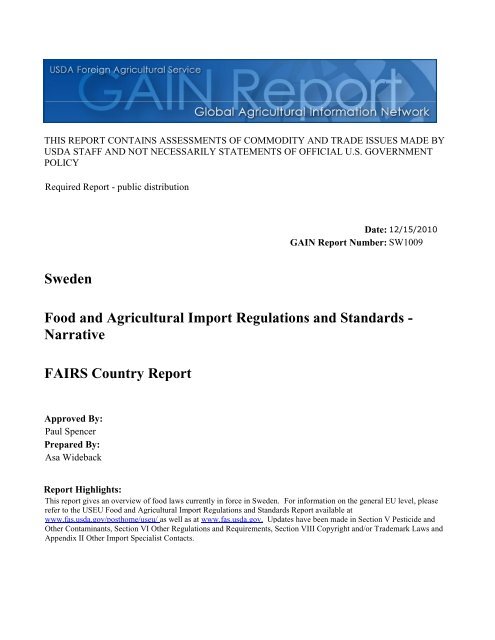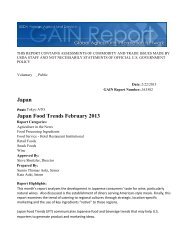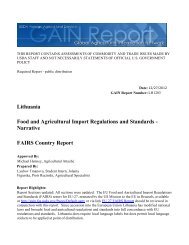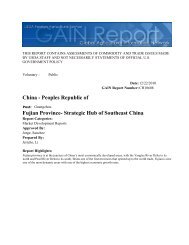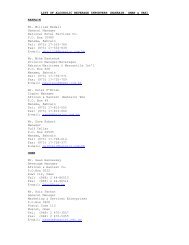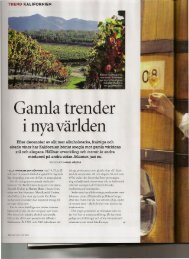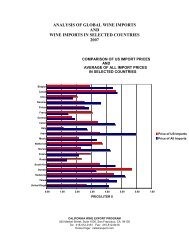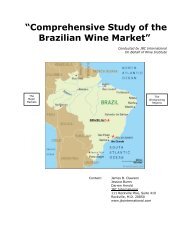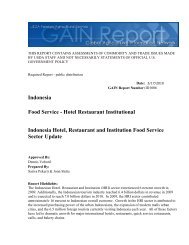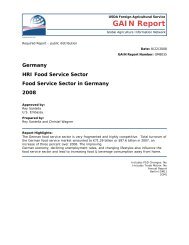FAIRS Country Report Food and Agricultural Import ... - GAIN
FAIRS Country Report Food and Agricultural Import ... - GAIN
FAIRS Country Report Food and Agricultural Import ... - GAIN
You also want an ePaper? Increase the reach of your titles
YUMPU automatically turns print PDFs into web optimized ePapers that Google loves.
THIS REPORT CONTAINS ASSESSMENTS OF COMMODITY AND TRADE ISSUES MADE BY<br />
USDA STAFF AND NOT NECESSARILY STATEMENTS OF OFFICIAL U.S. GOVERNMENT<br />
POLICY<br />
Required <strong>Report</strong> - public distribution<br />
Date:<br />
<strong>GAIN</strong> <strong>Report</strong> Number: SW1009<br />
12/15/2010<br />
Sweden<br />
<strong>Food</strong> <strong>and</strong> <strong>Agricultural</strong> <strong>Import</strong> Regulations <strong>and</strong> St<strong>and</strong>ards -<br />
Narrative<br />
<strong>FAIRS</strong> <strong>Country</strong> <strong>Report</strong><br />
Approved By:<br />
Paul Spencer<br />
Prepared By:<br />
Asa Wideback<br />
<strong>Report</strong> Highlights:<br />
This report gives an overview of food laws currently in force in Sweden. For information on the general EU level, please<br />
refer to the USEU <strong>Food</strong> <strong>and</strong> <strong>Agricultural</strong> <strong>Import</strong> Regulations <strong>and</strong> St<strong>and</strong>ards <strong>Report</strong> available at<br />
www.fas.usda.gov/posthome/useu/ as well as at www.fas.usda.gov. Updates have been made in Section V Pesticide <strong>and</strong><br />
Other Contaminants, Section VI Other Regulations <strong>and</strong> Requirements, Section VIII Copyright <strong>and</strong>/or Trademark Laws <strong>and</strong><br />
Appendix II Other <strong>Import</strong> Specialist Contacts.
Section I. <strong>Food</strong> Laws:<br />
Responsibility for the safety of food <strong>and</strong> agricultural products in Sweden is shared between three Swedish authorities: the<br />
Swedish Board of Agriculture, the National <strong>Food</strong> Administration (NFA) <strong>and</strong>, to a lesser degree, the National Board of<br />
Fisheries. The NFA is the central supervisory authority for matters relating to food, including imports.<br />
Sweden is a member of the European Union (EU) <strong>and</strong> Swedish national food legislation is, to a large extent, harmonized<br />
with the EU's food legislation. In certain cases, however, there is room for national interpretation of the EU's legislation.<br />
Sweden applies more restrictive legislation with regard to pesticides <strong>and</strong> irradiation, under the umbrella of public health<br />
precautions. In addition, Sweden has received a derogation allowing it to apply stricter salmonella control <strong>and</strong> stricter border<br />
controls (quarantine on imports of live animals) than that of other EU member countries. Traditionally, Sweden has not had<br />
outbreaks of salmonella. This is due to a combination of a sea barrier separating Sweden from the continent, border control<br />
<strong>and</strong> an extensive <strong>and</strong> far-reaching domestic control system.<br />
This report gives an overview of food laws currently in force in Sweden. For information on the general EU level, please<br />
refer to the USEU <strong>Food</strong> <strong>and</strong> <strong>Agricultural</strong> <strong>Import</strong> Regulations <strong>and</strong> St<strong>and</strong>ards <strong>Report</strong> available at<br />
www.fas.usda.gov/posthome/useu/ as well as at www.fas.usda.gov.<br />
Section II. Labeling Requirements:<br />
Please refer to the USEU <strong>FAIRS</strong> <strong>Report</strong>. Information on labeling requirements specific for Sweden is given below.<br />
Small Packages<br />
Sweden applies specific labeling requirements for “small packages” where the largest surface is less than 10 cm 2 . This<br />
exemption is not generally applicable throughout the EU. Specific nutritional labeling rules are still applicable when a socalled<br />
nutrition claim is included on the label. For margarine, a fat declaration is required regardless of the size of the<br />
package. Information on sweetener content is also required on small packages. <strong>Food</strong>stuffs consisting of one single<br />
ingredient need no list of ingredients if the sales name of the foodstuff is identical to the sales name of the ingredient, or if<br />
the ingredient is clearly stated by the sales name, e.g. tea, sugar, raisins.<br />
The Swedish ”Keyhole” Logo<br />
In 1989, the National <strong>Food</strong> Administration implemented a voluntary labeling system for foods that are leaner <strong>and</strong> contain<br />
less sugars <strong>and</strong> salt <strong>and</strong> more fiber than food products of the same type normally do. A "keyhole" symbol can be printed on<br />
the package of these products, be attached on shelves in stores or used in advertising <strong>and</strong> marketing of the products. The<br />
symbol is free of cost as well as free to use for products from all countries. No previous acceptance or licensing is<br />
necessary. Its application is supervised by the local public health administration. However, the products must meet the<br />
st<strong>and</strong>ards established by the National <strong>Food</strong> Administration. Detailed information about the keyhole symbol can be found at<br />
the following link.<br />
http://www.slv.se/upload/nfa/documents/food_regulations/Keyhole_2005_9.pdf<br />
Section III. Packaging <strong>and</strong> Container Regulations:<br />
Please refer to the USEU <strong>FAIRS</strong> <strong>Report</strong>. Information on packaging <strong>and</strong> container regulations specific for Sweden is given<br />
below.<br />
Recycling of Packaging Materials in Packaging Waste<br />
Plastic bottles <strong>and</strong> metal cans may not be sold in Sweden unless they participate in an approved recovery system. The annual<br />
registration fee to participate in a recovery system is 10,000 SEK (approximately US$1,400). For more detailed information<br />
please refer to the Swedish “Ordinance on deposit-<strong>and</strong>-return system for plastic bottles <strong>and</strong> metal cans” at the following link:<br />
http://www.sjv.se/download/18.1d07c3f108381dd74480002170/SFS+2005-220+eng.+ver.doc<br />
Section IV. <strong>Food</strong> Additives Regulations:
Please refer to the USEU <strong>FAIRS</strong> <strong>Report</strong>.<br />
Section V. Pesticides <strong>and</strong> Other Contaminants:<br />
Please refer to the USEU <strong>FAIRS</strong> <strong>Report</strong>. Information on pesticide <strong>and</strong> contaminant regulations specific for Sweden is given<br />
below.<br />
Swedish Maximum Residue Levels for Dioxins in Fish<br />
Sweden applies EU maximum residue levels with regard to dioxin. Due to the relatively high dioxin levels in fish from the<br />
Baltic Sea, however, Sweden (<strong>and</strong> Finl<strong>and</strong>) has received a derogation allowing fish with dioxin levels exceeding the EU<br />
thresholds to be sold in Sweden under the condition that they are not exported to other EU countries. This exception will<br />
remain until 2011. During 2011, the Swedish government will decide whether to apply for a new derogation. Its decision<br />
will be based on an investigation led by the National <strong>Food</strong> Administration.<br />
Atomic Radiation<br />
Sweden applies national maximum permitted levels of radioactivity in food: 300 Bq/kg for meat, meat products, cereal-based<br />
fruits (except nuts) vegetables (except mushrooms), baby food, dairy products <strong>and</strong> marine (sea) fish. The limit for game<br />
meat, fish from inl<strong>and</strong> waters, wild berries <strong>and</strong> mushrooms <strong>and</strong> nuts is 1500 Bq/kg.<br />
Section VI. Other Regulations <strong>and</strong> Requirements:<br />
A. Product Inspection <strong>and</strong> Registration Requirement<br />
Please refer to the USEU <strong>FAIRS</strong> <strong>Report</strong>.<br />
B. Certification <strong>and</strong> Documentation Requirements<br />
Please refer to the USEU <strong>FAIRS</strong> <strong>Report</strong>. Information on certification <strong>and</strong> document requirements specific for Sweden is<br />
given below.<br />
Swedish Salmonella Control Program<br />
Fresh meat (included frozen), ground meat <strong>and</strong> meat preparations imported into Sweden are subject to salmonella control at<br />
the border inspection post, unless a declaration on the veterinary certificate states that it has been tested according to<br />
Commission decision 1688/2005.<br />
Section VII. Other Specific St<strong>and</strong>ards:<br />
A. Genetically Modified <strong>Food</strong>s (GMOs)<br />
Please refer to the USEU <strong>FAIRS</strong> <strong>Report</strong>.<br />
B. Novel <strong>Food</strong>s<br />
Please refer to the USEU <strong>FAIRS</strong> <strong>Report</strong>.<br />
C. Dietetic or Special Use <strong>Food</strong><br />
Please refer to the USEU <strong>FAIRS</strong> <strong>Report</strong>.<br />
D. Wine, Beer <strong>and</strong> Other Alcoholic Beverages
Please refer to the USEU <strong>FAIRS</strong> <strong>Report</strong>. Information specific for Sweden is given below.<br />
Swedish Alcohol Monopoly<br />
Retail sales of wine <strong>and</strong> liquor in Sweden are restricted to a government agency, Systembolaget. Systembolaget h<strong>and</strong>les all<br />
over-the-counter sales of wine, spirits, <strong>and</strong> full-strength beer in Sweden. The Government of Sweden (GOS) managed to<br />
retain the retail monopoly despite its accession to the EU in 1995, but had to relinquish its monopoly on importing,<br />
wholesaling, production <strong>and</strong> exporting of wines <strong>and</strong> spirits. <strong>Import</strong>ers other than Systembolaget must either supply the<br />
government monopoly or restrict their sales to the hotel <strong>and</strong> restaurant trade. To import <strong>and</strong>/or produce alcoholic beverages,<br />
a license issued by the Special Tax Office in Ludvika is required, but imports are otherwise unrestricted.<br />
E. Organic <strong>Food</strong>s<br />
Please refer to the USEU <strong>FAIRS</strong> <strong>Report</strong>. Information on organic food st<strong>and</strong>ards specific for Sweden is given below.<br />
Swedish KRAV-Label<br />
The association KRAV has long been, <strong>and</strong> still is, a key player on the organic market in Sweden. KRAV develops organic<br />
st<strong>and</strong>ards <strong>and</strong> promotes the KRAV label. Until recently, it was difficult to market organic products in Sweden without the<br />
KRAV label. The KRAV seal is still the dominant organic label in Sweden, but the awareness of other labels, such as the EU<br />
logo, is increasing.<br />
The KRAV st<strong>and</strong>ards are based on the International Federation of Organic Agriculture Movement (IFOAM) st<strong>and</strong>ards for<br />
organic production <strong>and</strong> are also compatible with EU regulations. For U.S. organic products which are IFOAM certified,<br />
getting access to the KRAV seal is not problematic. Without IFOAM certification, obtaining the KRAV seal could be both<br />
time-consuming <strong>and</strong> costly.<br />
Four private organizations are recognized by the National <strong>Food</strong> Administration to carry out inspection <strong>and</strong> certification.<br />
These are Aranea Certifiering AB (subsidiary to KRAV), SMAK AB, HS Certifiering AB <strong>and</strong> Valiguard AB.<br />
F. Vertical Legislation (Breakfast Directives)<br />
Please refer to the USEU <strong>FAIRS</strong> <strong>Report</strong>.<br />
G. Animal Products<br />
Please refer to the USEU <strong>FAIRS</strong> <strong>Report</strong>.<br />
H. Frozen <strong>Food</strong>stuffs<br />
Please refer to the USEU <strong>FAIRS</strong> <strong>Report</strong>.<br />
I. Ionizing Radiation<br />
Please refer to the USEU <strong>FAIRS</strong> <strong>Report</strong>. Information on ionizing radiation requirements specific for Sweden is given below.<br />
Swedish legislation only allows for spices to be treated with irradiation. A food that has been treated with irradiation may be<br />
imported only if the treatment is permitted in Sweden.<br />
J. Fruits <strong>and</strong> Vegetables<br />
Please refer to the USEU <strong>FAIRS</strong> <strong>Report</strong>.<br />
K. Seafood
Please refer to the USEU <strong>FAIRS</strong> <strong>Report</strong>.<br />
Section VIII. Copyright <strong>and</strong>/or Trademark Laws:<br />
Please refer to the USEU <strong>FAIRS</strong> <strong>Report</strong>. Information on trademarks specific for Sweden is given below.<br />
Registration of a trademark in Sweden may be obtained through the filing of an application with the Swedish Patent <strong>and</strong><br />
Registration office. All communications <strong>and</strong> submitted documents must be in Swedish. Contact information for this office<br />
is the following:<br />
Trademarks Department<br />
Box 530<br />
SE-826 27 Söderhamn<br />
Phone: +46 8-782 25 00<br />
Fax: +46 270-173 51<br />
E-mail: prv.varumarke@prv.se<br />
Protected Geographical Indications<br />
Please refer to the USEU <strong>FAIRS</strong> <strong>Report</strong>.<br />
Section IX. <strong>Import</strong> Procedures:<br />
Please refer to the USEU <strong>FAIRS</strong> <strong>Report</strong>.<br />
To import foodstuffs for commercial purposes it is necessary to be registered as an importer with the National <strong>Food</strong><br />
Administration. The application should be sent to:<br />
Livsmedelsverket<br />
Box 622<br />
751 26 Uppsala<br />
Sweden<br />
Telephone +46 18 17 55 00<br />
Web site: http://www.slv.se<br />
National <strong>and</strong> EU import license/sanitary certificate can be obtained from:<br />
National Board of Agriculture<br />
551 82 Jönköping<br />
Sweden<br />
Telephone +46 36 15 50 00<br />
Web site www.sjv.se.<br />
The VAT rate for foodstuffs in Sweden is 12%, but a higher rate of 25% applies to alcoholic beverages <strong>and</strong> tobacco<br />
products. Other potential taxes <strong>and</strong> charges include an alcohol tax, a r<strong>and</strong>om sampling fee, a plant protection fee or a quality<br />
control fee.<br />
Information on customs clearance can be obtained from the Swedish Customs website<br />
http://www.tullverket.se/en<br />
Appendix I. Government Regulatory Agency Contacts:<br />
For U.S. exporters <strong>and</strong> Swedish importers, the key authority for food legislation, as well as enforcement thereof, is generally<br />
the National <strong>Food</strong> Administration (NFA). Therefore, it is recommended that U.S. companies or their import agents primarily<br />
contact the NFA:
Livsmedelsverket (National <strong>Food</strong> Administration)<br />
Box 622<br />
751 26 Uppsala<br />
Sweden<br />
Tel: +46 18 17 55 00<br />
Web site: www.slv.se<br />
However, it should be mentioned that other state authorities also have responsibility for issuing regulations affecting<br />
imports.<br />
Veterinary, sanitary <strong>and</strong> phytosanitary issues, such as plant protection, animal health <strong>and</strong> animal welfare requirements <strong>and</strong><br />
imports of live animals, are h<strong>and</strong>led by the following authority:<br />
Jordbruksverket, (Swedish Board of Agriculture)<br />
SE-551 82 Jönköping,<br />
Sweden<br />
Telephone + 46 36 15 50 00<br />
Telefax + 46 36 19 05 46<br />
e-mail: jordbruksverket@sjv.se.<br />
The Board is responsible for import controls aimed at the prevention of diseases <strong>and</strong> pests as well as quality control of fruit,<br />
vegetables <strong>and</strong> meat classification. They also oversee the import of PET bottles <strong>and</strong> aluminum cans. In addition, the<br />
Swedish Board of Agriculture is the key authority for exporters/importers with regard to applications for tariff-rate quotas<br />
(reduced or zero tariffs within a quota).<br />
The National Board of Fisheries advises the NFA on fishery topics. However, it does not directly fulfill any official<br />
functions with regard to import controls/legislation:<br />
Fiskeriverket (National Board of Fisheries)<br />
Box 423<br />
SE-401 26 Gothenburg<br />
http://www.fiskeriverket.se<br />
Telephone: + 46 31 743 03 00<br />
Telefax: 46 31 743 04 44<br />
In order to import alcoholic beverages, a special permit must be obtained. Applications for permits are obtained at:<br />
Särskilda skattekontoret (The Special Tax Office in Sweden)<br />
771 83, Ludvika,<br />
Sweden,<br />
Tel +46 240 870 00<br />
http://www.rsv.se<br />
Some health foods may be classified as pharmaceutical products. The contact for such products is:<br />
Läkemedelsverket (Medical Products Agency)<br />
Box 26<br />
751 03 Uppsala, Sweden<br />
Tel: +46 18 17 46 00<br />
www.mpa.se<br />
Information regarding Swedish Trademark Protection can be obtained from:
PRV Bolag<br />
SE-851 81 Sundsvall, Sweden,<br />
Telephone +46 60 18 40 00<br />
Telefax +46 60 12 98 40<br />
E-mail prv.bolag@prv.se<br />
The contact point for consultation/notification relating to the granting of single authorizations involving several Member<br />
States is:<br />
The Swedish Customs Administration<br />
P.O. Box 12 854<br />
SE-112 98 Stockholm, Sweden<br />
Telephone: +46 771 - 520 520<br />
Fax: +46 8 20 80 12<br />
www.tullverket.se/en<br />
Customs clearance<br />
E-mail: malardalen.info@tullverket.se<br />
Phone +46 771 23 23 23 (open 8 a.m. to 4 p.m.) to get answers to your questions about Customs matters. On the telephone<br />
you will first hear a message in Swedish. Wait until the message is over, then press number 5 on the telephone keypad <strong>and</strong><br />
you will be connected to a Customs officer who can answer your questions in English.<br />
The authority responsible for issuing permits to import alcoholic beverages into Sweden is:<br />
Särskilda skattekontoret (The Special Tax Office in Sweden)<br />
771 83, Ludvika, Sweden<br />
Tel: +46 240 870 00<br />
www.rsv.se<br />
Appendix II. Other <strong>Import</strong> Specialist Contacts:<br />
U.S. Embassy<br />
Foreign <strong>Agricultural</strong> Service<br />
Dag Hammarskjölds Väg 31<br />
115 89 Stockholm<br />
Tel: + 46 8 783 5470/5392<br />
Fax: +46 8 662 8495<br />
Email: AgStockholm@fas.usda.gov<br />
Author Defined:<br />
Disclaimer: This report was prepared by the Office of <strong>Agricultural</strong> Affairs of the USDA/Foreign <strong>Agricultural</strong> Service<br />
in Stockholm, Sweden for U.S. exporters of domestic food <strong>and</strong> agricultural products. While every possible care was<br />
taken in the preparation of this report, information provided may not be completely accurate either because policies<br />
have changed since its preparation, or because clear <strong>and</strong> consistent information about these policies was not available.<br />
It is highly recommended that U.S. exporters verify the full set of import requirements with their foreign customers,<br />
who are normally best equipped to research such matters with local authorities, before any goods are shipped. FINAL<br />
IMPORT APPROVAL OF ANY PRODUCT IS SUBJECT TO THE IMPORTING COUNTRY’S RULES AND<br />
REGULATIONS AS INTERPRETED BY BORDER OFFICIALS AT THE TIME OF PRODUCT ENTRY.


